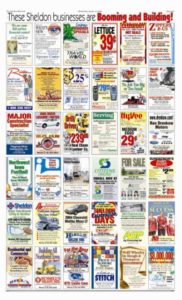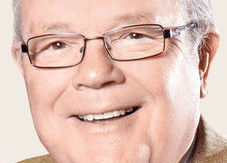by Peter W. Wagner
When my wife, Connie, and I founded our first publication, The Golden Shopper, we were still in the first year of our marriage. It was October 3, 1962.
Our little town of Sibley had less than 2,500 population and we only printed 3,000 copies each week. The paper was printed two pages at a time on an Addressograph-Multigraph 2066LD and every third sheet jammed between the rollers. We had to overprint the first run so we’d have enough when we flipped the stack over to print the other side.
 I wasn’t able to sell any ads to the local National Food store or any other business managed from distant locations.
But over time I was able to convince hometown merchants, banks, insurance offices and auto sales and service centers to use our shopper.
I wasn’t able to sell any ads to the local National Food store or any other business managed from distant locations.
But over time I was able to convince hometown merchants, banks, insurance offices and auto sales and service centers to use our shopper.
All of the ads were what you would consider small at first, but we were thankful for even a 1×3. An average paper was eight 11 x 17 tabloid pages. It always irked me when an advertiser would give me an ad half the size as the one placed in the local newspaper. If the paper got a half page, I got a fourth.
But over time my wife and I were able to create stronger relationships with our clients. We provided fresh creative ideas, sincere personal service and sometimes even helped with the firm’s point-of-purchase materials.
Most importantly, we made it a point to always ask the client about the effectiveness of the ad after it was printed.
Doing so helped us create better ads with stronger specials and wording in the future. The size of our ads grew eventually and so did the number of accounts choosing to advertise exclusively with us. Times were good and 10 years later Connie and I founded The N’West Iowa REVIEW.
We only had three subscribers the first edition but have seen it grow to 6,000 paid circulation newspaper. But unfortunately, newspaper and shopper publishers, me included, find ourselves today in a situation similar to when my wife and I first started in the publishing business. The number of retailers in smaller communities has been reduced by as much as half. Radio and television stations have cut rates dramatically and some cable operations are offering 100 spots for $1,000.
Back home, most corporate stores have retrenched to larger metro markets and the internet is scooping up grocery and clothing sales once processed locally. Worst of all, there are rumors everywhere that print is no long viable.
The pandemic is one reason. It has created huge unemployment numbers. There is fear of inflation and, even with the stimulus program, discretionary spending is down.
Many of our core advertisers have come to think they’re wasting dollars advertising at this time.
The correct answer is to think small to get big. Publishers and sales managers need to offer packages that cost the advertiser very little, but attract many buyers.
We’ve always had a good response with our Sheldon Mail-Sun “Full Page for $55” package.
 The promotion runs the third week of the month for 37 months and features a page of 26 1×3 inch process color ads on the inside of the broadsheet’s back page. Each advertiser is billed $55 monthly for the small ad and is encouraged to change the copy regularly.
The promotion runs the third week of the month for 37 months and features a page of 26 1×3 inch process color ads on the inside of the broadsheet’s back page. Each advertiser is billed $55 monthly for the small ad and is encouraged to change the copy regularly.
The back page, meanwhile, features a message from one of the 37 advertisers in a full-page. Full color, layout. That advertiser, too, is only billed $55 for the featured full page location.
Because of the low monthly price, the package can easily be sold to just about any size business from a hair salon to a major grocery store.
The math adds up quickly. The two pages produce $2,035 each month, which is more than our posted price for two full pages, and they bring in a total of $75,295 over the 37 months.
But the salesperson must make it clear that the package runs the full 37 months, so every business has an opportunity to have the featured page. By making that clear from the beginning, we have never had a single firm drop the promotion before it was finished.
Newspapers and shoppers are still a viable business. But publishers and sales managers are going to have to offer many more packages, promotions and special sections to claim their share of the advertising dollar.
Simply talking about the paper’s long publishing history, desirable audience, client-salesperson relationship and past successes is not going to be enough. We’re going to have to win back the market step-by-step and we need to do it now with new ideas, a solid understanding and belief in the importance of our publication to the community and a strong commitment to succeed.
 Nevada Press Association The best in Nevada journalism since 1924
Nevada Press Association The best in Nevada journalism since 1924
